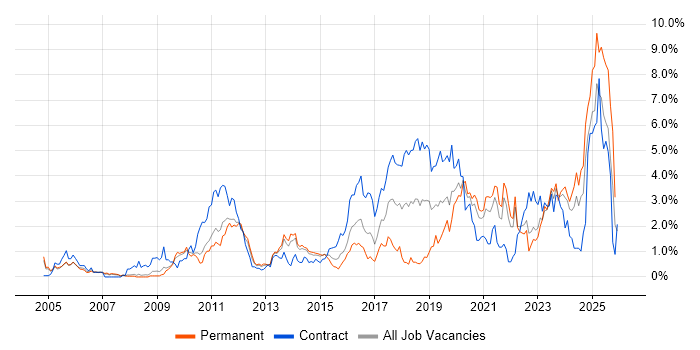JUnit
London > South London
The table below provides summary statistics for permanent job vacancies advertised in South London requiring JUnit skills. It includes a benchmarking guide to the annual salaries offered in vacancies that cited JUnit over the 6 months leading up to 31 May 2025, comparing them to the same period in the previous two years.
| 6 months to 31 May 2025 |
Same period 2024 | Same period 2023 | |
|---|---|---|---|
| Rank | 60 | 65 | 73 |
| Rank change year-on-year | +5 | +8 | +17 |
| Permanent jobs citing JUnit | 29 | 24 | 13 |
| As % of all permanent jobs advertised in South London | 4.08% | 2.73% | 1.92% |
| As % of the Development Applications category | 29.90% | 25.53% | 14.94% |
| Number of salaries quoted | 0 | 4 | 9 |
| 10th Percentile | - | £63,125 | - |
| 25th Percentile | - | £65,938 | £75,000 |
| Median annual salary (50th Percentile) | - | £70,000 | £85,000 |
| Median % change year-on-year | - | -17.65% | +6.25% |
| 75th Percentile | - | £72,500 | £91,250 |
| 90th Percentile | - | - | £92,000 |
| London median annual salary | £70,000 | £70,000 | £85,000 |
| % change year-on-year | - | -17.65% | - |
All Development Application Skills
South London
JUnit falls under the Development Applications category. For comparison with the information above, the following table provides summary statistics for all permanent job vacancies requiring development application skills in South London.
| Permanent vacancies with a requirement for development application skills | 97 | 94 | 87 |
| As % of all permanent jobs advertised in South London | 13.64% | 10.68% | 12.87% |
| Number of salaries quoted | 10 | 65 | 52 |
| 10th Percentile | - | £46,250 | £41,000 |
| 25th Percentile | £32,000 | £61,250 | £51,250 |
| Median annual salary (50th Percentile) | £44,500 | £67,500 | £70,000 |
| Median % change year-on-year | -34.07% | -3.57% | +21.74% |
| 75th Percentile | £58,438 | £83,750 | £80,000 |
| 90th Percentile | £62,875 | £86,900 | £92,375 |
| London median annual salary | £75,000 | £75,000 | £74,000 |
| % change year-on-year | - | +1.35% | +2.07% |
JUnit
Job Vacancy Trend in South London
Job postings citing JUnit as a proportion of all IT jobs advertised in South London.

JUnit
Salary Trend in South London
3-month moving average salary quoted in jobs citing JUnit in South London.
JUnit
Job Locations in South London
The table below looks at the demand and provides a guide to the median salaries quoted in IT jobs citing JUnit within the South London region over the 6 months to 31 May 2025. The 'Rank Change' column provides an indication of the change in demand within each location based on the same 6 month period last year.
| Location | Rank Change on Same Period Last Year |
Matching Permanent IT Job Ads |
Median Salary Past 6 Months |
Median Salary % Change on Same Period Last Year |
Live Jobs |
|---|---|---|---|---|---|
| Croydon | +5 | 29 | - | - | |
| JUnit London |
|||||
JUnit
Co-occurring Skills and Capabilities in South London by Category
The follow tables expand on the table above by listing co-occurrences grouped by category. The same employment type, locality and period is covered with up to 20 co-occurrences shown in each of the following categories:
|
|
||||||||||||||||||||||||||||||||||||||||||||||||||||||||||||||||||||||||||||||
|
|
||||||||||||||||||||||||||||||||||||||||||||||||||||||||||||||||||||||||||||||
|
|
||||||||||||||||||||||||||||||||||||||||||||||||||||||||||||||||||||||||||||||
|
|
||||||||||||||||||||||||||||||||||||||||||||||||||||||||||||||||||||||||||||||
|
|
||||||||||||||||||||||||||||||||||||||||||||||||||||||||||||||||||||||||||||||
|
|
||||||||||||||||||||||||||||||||||||||||||||||||||||||||||||||||||||||||||||||
|
|
||||||||||||||||||||||||||||||||||||||||||||||||||||||||||||||||||||||||||||||
|
|||||||||||||||||||||||||||||||||||||||||||||||||||||||||||||||||||||||||||||||
